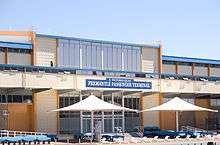Fremantle Passenger Terminal
| Fremantle Passenger Terminal | |
|---|---|
|
Main entrance | |
| Former names | Port of Fremantle Passenger Terminal |
| Alternative names | Victoria Quay Function and Exhibition Centre |
| General information | |
| Status | Operational |
| Type | Passenger terminal |
| Architectural style | Post war international |
| Location | Victoria Quay, Fremantle |
| Address | Lot 2114 Beach St, Fremantle |
| Town or city | Fremantle, Western Australia |
| Country | Australia |
| Coordinates | 32°02′51″S 115°44′52″E / 32.0475°S 115.7478°ECoordinates: 32°02′51″S 115°44′52″E / 32.0475°S 115.7478°E |
| Current tenants | Fremantle Port Authority |
| Groundbreaking | 1958 |
| Construction started | 1960 |
| Completed | 1962 |
| Opened |
Stage one: December 1960 Stage two: May 1962 |
| Owner | Fremantle Port Authority |
| Design and construction | |
| Architecture firm | Hobbs, Winning and Leighton |
| Other designers | Howard Taylor |
| Main contractor | AT Brine & Sons and the Fremantle Harbour Trust |
| Website | |
|
fremantleports | |
The Fremantle Passenger Terminal was built on Victoria Quay, Fremantle in 1960–62,[1][2][3] and opened in time for arrival of competitors for the Empire Games in 1962. The terminal is the largest in Australia and is the only passenger terminal in Australia capable of berthing two cruise liners simultaneously.[4][5]
Significance
In 2000 the building was permanently listed on the State Register of Heritage Places, was classified by the National Trust in 2001, and was also registered on the former Register of the National Estate.[4][6] The 50th anniversary was celebrated in 2010.[7]
History
Since its construction, Fremantle Harbour has been the major port of call for vessels of all types, including ocean liners bringing migrants and tourists to Western Australia. In the 1950s the Fremantle Port Authority recognised the need to improve the facilities for processing arrivals as the post World War II immigration policy was seeing large number of migrants arriving in Fremantle. The arrivals were being processed in sheds and offices on Victoria Quay, so it was decided to build dedicated facilities. The planning, which commenced in 1957, considered the future needs of the port, so designed a facility capable of processing two ocean liners simultaneously. Hobbs, Winning and Leighton was the architectural firm that designed the building in the post war international style, with AT Brine & Sons and the Fremantle Harbour Trust commencing construction in 1958.[8]
The first stage F shed was opened by Premier David Brand in December 1960. The SS Oriana on its maiden voyage was the first vessel to berth at the new terminal.[9] Between the opening of the first stage and the opening of the second stage G shed in May 1962 over 250,000 passengers passed through the terminal.[8]
References
- ↑ Fremantle Harbour Trust (1960), Port of Fremantle passenger terminal, Fremantle Harbour Trust, retrieved 24 December 2013
- ↑ Fremantle Harbour Trust (1962), Port of Fremantle Passenger Terminal, Fremantle Harbour Trust, retrieved 24 December 2013
- ↑ Western Australia. Fremantle Port Authority, Port of Fremantle Passenger Terminal (3rd reprint ed.), Fremantle Port Authority, retrieved 24 December 2013
- 1 2 "Register document". Fremantle Passenger Terminal. Heritage Council of Western Australia. Retrieved 26 January 2013.
- ↑ "Fremantle Passenger Terminal". Heritage listing. Heritage Council of Western Australia. Retrieved 26 January 2013.
- ↑ "Port of Fremantle Passenger Terminal". Register place number 03363. InHerit WA. Archived from the original on 3 December 2012. Retrieved 26 January 2013.
- ↑ Fremantle Ports (2010), Fremantle passenger terminal : 50 years, Fremantle Ports, retrieved 24 December 2013
- 1 2 "Fremantle Passenger Terminal 50 years" (PDF). Fremantle Port Authority. Retrieved 26 January 2013.
- ↑ "Victoria Quay". Assessment document. Heritage Council of Western Australia. Retrieved 27 January 2013.
External links
![]() Media related to Fremantle Passenger Terminal at Wikimedia Commons
Media related to Fremantle Passenger Terminal at Wikimedia Commons
- "Freo... way to go for cruising" – article by Niall McIlroy in The West Australian about boarding a cruise ship at Fremantle Passenger Terminal
